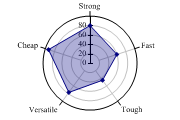| Professional charting tools for .Net developers |
Introducing SharpPlot
Your First Chart
Recent Updates
Sample Charts
Tutorials
General Tutorials
Chart Tutorials
SharpPlot Class
Properties
Structures
Enumerations
Style examples
Glossaries
Active Charts
VectorMath Class
DBUtil Class
Get SharpPlot
Download SharpPlot
Buying SharpPlot
SharpPlot Support
Upgrading from GraPL
Release notes
Reference > Methods > DrawPolarChart Method
SharpPlot.DrawPolarChart Method
Construct polar or radar chart from data (radial=Y, angular=X).
Example
sp.SetMargins(12,6,0,0); sp.PolarChartStyle = PolarChartStyles.Markers|PolarChartStyles.SurfaceShading| PolarChartStyles.GridLines|PolarChartStyles.HollowCenter; sp.SetYRange(0,100); sp.SetFillStyles(FillStyle.Opacity30); sp.SetMarkers(Marker.Lozenge); sp.SetXLabels(new string[]{"Strong","Fast","Tough","Versatile","Cheap"}); sp.DrawPolarChart(new int[] {80,60,45,77,93});
The short tutorial shows a few of the possibilities and some sample code.
Overloads
- public void DrawPolarChart(int[] data);
- public void DrawPolarChart(double[] data);
- public void DrawPolarChart(int[][] data);
- public void DrawPolarChart(double[][] data);
- public void DrawPolarChart(int[] data,int[] xValues);
- public void DrawPolarChart(double[] data,int[] xValues);
- public void DrawPolarChart(int[] data,double[] xValues);
- public void DrawPolarChart(double[] data,double[] xValues);
- public void DrawPolarChart(int[][] data,int[] xValues);
- public void DrawPolarChart(double[][] data,int[] xValues);
- public void DrawPolarChart(int[][] data,double[] xValues);
- public void DrawPolarChart(double[][] data,double[] xValues);
Description
The Polar chart (also known as the Radar chart) may be used in several ways to handle cyclic timeseries or comparisons on many dimensions. If it is called with a simple list of numbers, it treats each value as a logical axis and simply plots the values out as a star shape with as many points as there were values. This can be used very effectively to compare items on different criteria, for example several digital cameras might be compared on (price,zoom,resolution,color fidelity, memory size) each rated from 0 to 10 on an arbitrary scale.
Polar charts are also used as circular lineplots, typically for daily or annual timeseries where it makes sense to plot the values around a circle. They can also be used to represent genuinely directional data, such as a plot of wind-directions recorded over a month, or current flows at various locations on a map.
See also ...
Polar and Radar Charts | SharpPlot Members | PolarChartStyle Property
